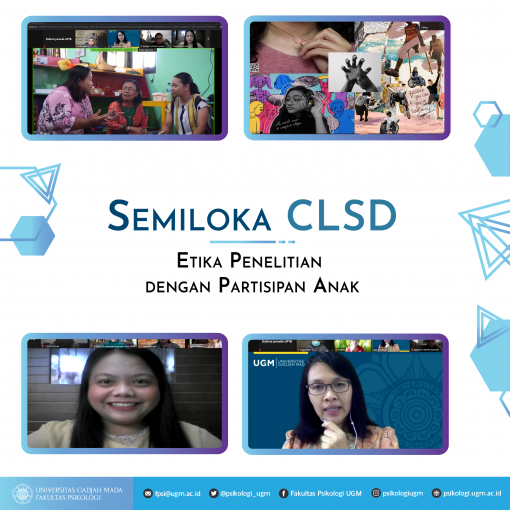
Thursday (4/2) Center for Life-Span Development (CLSD), Faculty of Psychology UGM collaborated with the Doctoral Program of Psychology, Faculty of Psychology UGM to hold a workshop with the theme “Research Ethics with Child Participants”. This semiloka event was attended by 125 people from various walks of life, such as academics from various higher education institutions in Indonesia, teachers from various schools, NGOs, researchers, even housewives.
This seminar program was divided into two sessions and opened by Mrs. Elga Andriana, M.Ed., Ph.D, as the Head of CLSD. For the first session it starts at 08.10 and ends at 10.00, while for the second session it starts at 10.10 to 11.00 noon.
In the first session, the material was delivered by Mrs. T. Novi Poespita Candra, M.Sc., Ph.D, who explained about “Methodological and Ethical Challenges of Research with Children”. Novi said that ethics can produce research that is useful for good and does not harm certain groups. In addition, ethics also produces research that is physically and psychologically safe.
According to Novi, there are several things that must be considered regarding the benefits and dangers of using children as participants. First, no child should be discriminated against or experience discrimination. Second, researchers, research organizations and governments have a responsibility to do their best and ensure children are protected. Third, children have the right to be protected from harmful and exploitative research. Fourth, researchers have a responsibility to ensure all children have access to support.
In the second session, Mrs. Elga Andriana, M.Ed., Ph.D, discussed the topic “Research Involving Ethical and Inclusive Children”. One of the things conveyed by Elga was the ethical principles of research involving children with special needs.
“There are four principles, namely respect, trust, strengths, and inclusice of diversity. The principle of respect is related to respecting children’s self-esteem, believing that they are capable, and respecting their views seriously, ”said Elga.
Then, the principle of trust is the time it takes to build trust with children and their communities. Third, there is the strength principle, which means that researchers focus on their strengths, trying to find positive things from children who are involved in the research. Finally, there is the principle of inclusive diversity related to the ability to adapt to the abilities of others, explained Elga in this second session.
The organizer hopes that the seminar and workshop this time can be a forum for sharing between presenters and participants on the topic of “Research Ethics with Child Participants”. Especially related to the discussion of ethics and informed consent as a form of appreciation for researchers to respect participants, especially child participants.
